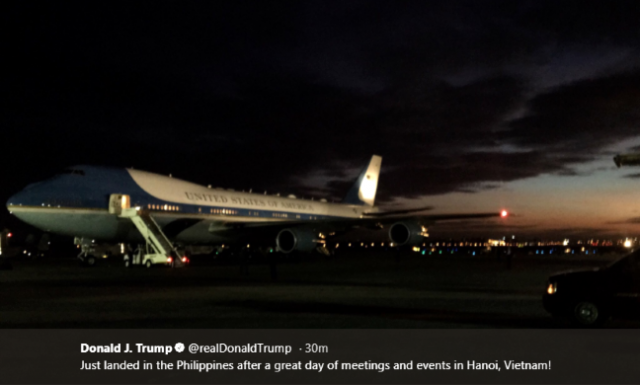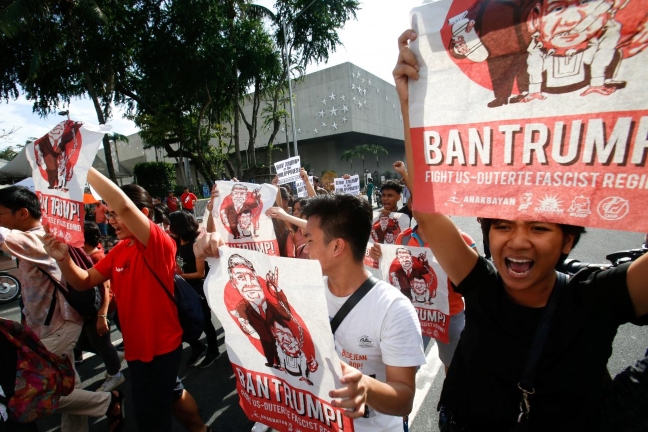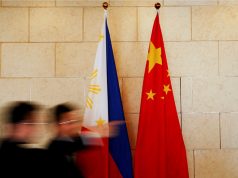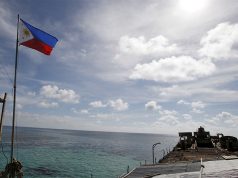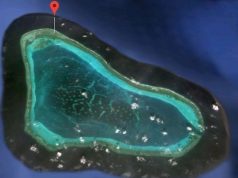MANILA – United States President Donald Trump arrived in the Philippines late Sunday afternoon on the fourth leg of his Asian tour, for the events related to the 31st ASEAN Summit and other meetings, and the regional bloc’s celebration of its 50th founding anniversary.
The Civil Aviation Authority of the Philippines confirmed Trump’s arrival under very tight security. He was to rest briefly before attending the ASEAN 50th anniversary gala dinner, hosted by President Rodrigo Duterte.
Secretary of State Rex Tillerson arrived ahead of Trump, touching down at the Manila airport at 5:10 p.m.
Trump’s arrival comes on the heels of an offer he made, while attending the APEC Economic Leaders’ meeting in Vietnam, to mediate between China and the four ASEAN members who are claimants in the South China Sea maritime row.
Offer to mediate
Foreign Affairs Secretary Alan Peter Cayetano said Sunday the Philippines is open to Trump’s offer, but that such an issue is subject to consultations among claimant countries including China.
Cayetano said that, while the ASEAN members see it as a very kind and generous offer, they have to answer as a group or individually; and not one country can just give an instant reply because mediation involves all the claimants and non-claimant states.
Trump had said in his visit to Da Nang for the APEC meeting that he was ready to act as a mediator between China and the claimants who are ASEAN members: the Philippines, Vietnam, Malaysia and Brunei.
The dispute has been a constant item on every ASEAN Chairman’s Statement but has remained unresolved even with the July 2016 Hague ruling which China continues to disregard.
China, however, opposes any role by non- claimant countries, specifically the US, in resolving the territorial dispute.
South China Sea in US national interest
Although not a party to the dispute, the US has declared that it is in its national interest to ensure freedom of navigation, trade and peace and stability in the disputed parts of the South China Sea.
Meanwhile, Cayetano also said that President Duterte is open to discussing human rights with the leaders – something which, he said, the president already did even with other visiting US officials.
What irks Duterte, he explained, is when other nations try to dictate him on how to run his country
(Above) Protesters shout slogans during a protest against President Trump’s visit at the Philippine International Convention Center, venue of the upcoming ASEAN Summit. Carrying placards declaring “Dump Trump” and “Down with U.S. Imperialism”, the left-wing protesters were blocked by police in riot gear with shields and batons, and then showered with jets of water from a fire engine.
Before leaving for the gala dinner Sunday at the SMX Convention Center, Cayetano also met with the foreign ministers of Malaysia and Indonesia to talk about maritime security that focuses on piracy, terrorism and human trafficking
Last stop of marathon trip
The Philippines is Trump’s last stop on a marathon tour that has taken him to Japan, South Korea, China as well as Vietnam. Despite Trump’s “America First” policy, the visit should provide some reassurance that Washington remains committed to a region that Beijing sees as its strategic domain.
The increasing use of the phrase “Indo-Pacific” by Trump and his team during their Asian tour this week, instead of the more common “Asia-Pacific” term has been seen by analysts as an effort to depict the region as more than China-dominated.
Pacific Rim nation leaders agreed in Vietnam on Saturday to address “unfair trade practices” and “market distorting subsidies”, a statement that bore the imprint of Trump’s efforts to reshape the global trade landscape. – With a report by Dale Vera, Bloomberg TV Phils, and Reuters.

